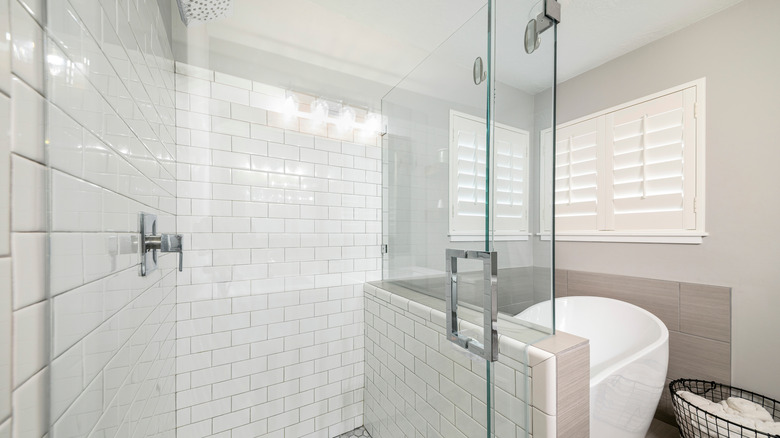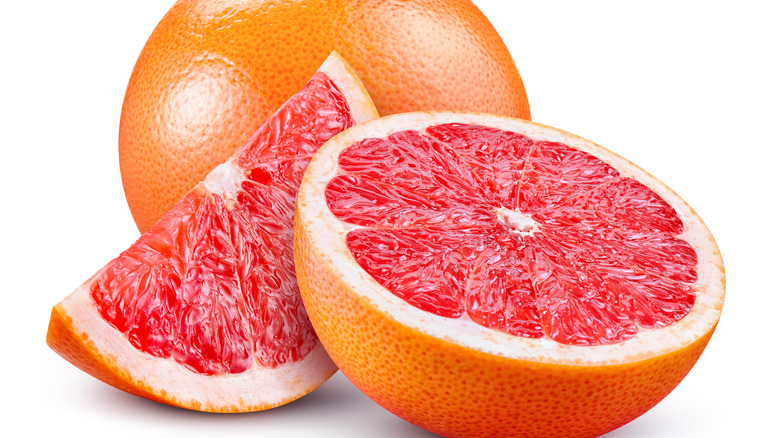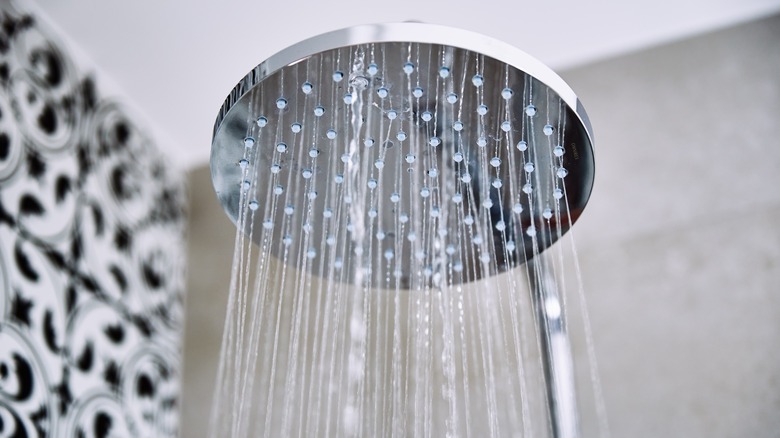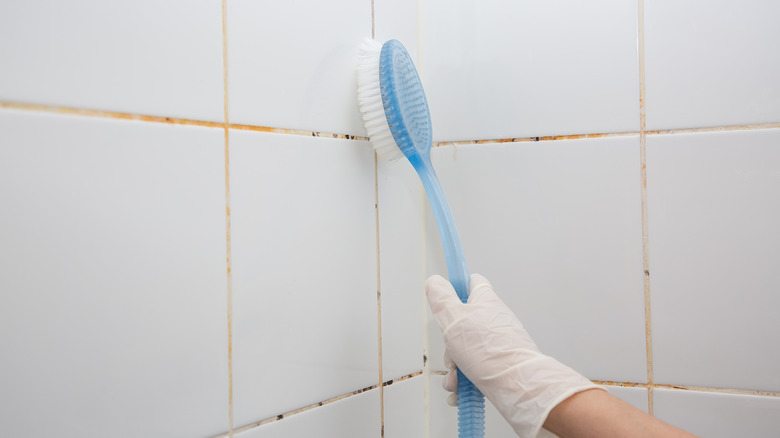The Best Tips And Tricks To Keep Your Shower Clean
Most of us know that bathrooms can be breeding grounds for germs. After all, daily personal activities, not to mention humidity, can take a toll. Yet, while you may think that the toilet is the center for germs and bacteria, you may be surprised to know that your shower is a germ fest all of its own.
Whether it's your shower curtain, tub floor, or tiles, just because you can't see anything doesn't mean it's clean. "Mold spores are microscopic — so if you can actually see the black color, you literally have millions or billions of spores present," germ expert Kelly Reynolds tells BuzzFeed.
Consequently, showers and bathtubs need to be cleaned regularly. "Do it at least twice a week with a disinfectant that contains bleach," says Dr. Paul Horowitz (via WebMD). Horowitz warns that when not cleaned regularly, "Germs can line the walls (of the tub) and you can easily touch the surface and then touch your mouth."
However, there are easy tips to keep your shower in tip-top shape and guard against germs and infections.
Disinfect your shower glass door
While bleach kills most germs and bacteria, it's possible to keep your shower clean by using gentle household pantry items. In a shower, the first thing you'll want to attack are the shower walls and glass. "Hard water stains, also known as limescale, are high in minerals which end up leaving behind a chalky residue on surfaces," says Brad Roberson, President of Glass Doctor. "When the water evaporates, the limescale remains, coating surfaces and clinging onto glass, tiles, and fixtures leaving behind hard, crusty deposits that change in color from white to green" (via MarthaStewart.com).
Surprisingly, you won't be able to remove hard water stains with a typical store-bought glass cleaner but you can use simple ingredients that you likely already have right in your kitchen to make a solution that works. Simply dip paper towels into slightly warmed white vinegar and stick them to your shower glass and walls. "The slightly acidic nature of vinegar allows it to soak into and loosen the mineral deposits," says Roberson. He advises leaving the paper towels on for 30-60 minutes and spraying them with more vinegar periodically so they don't dry out. Then remove paper towels, sprinkle baking soda on a sponge, and scrub down the surface. Rinse with distilled water and dry with a microfiber towel.
Remove soap scum with this fruit
Of all the things you can do with fruit, you might not think that removing soap scum would be one of them. Yet, Lauren Bowen, director of Two Maids & A Mop, says that one fresh-smelling citrus fruit works wonders on shower grime. Her recipe calls for taking half a grapefruit, pouring salt over the top of it and then rub in tiles (via Reader's Digest). She explains that when rub you the grapefruit on soap scum, you'll soon notice it starts to disappear. "The grapefruit's citric acid and the coarseness of the salt work together to power through stubborn scum."
"Soap scum builds up easily and normally requires consistent scrubbing to remove," warns Bowen. Your best bet is to regularly scrub down your shower to prevent soap scum from ever building and keep mineral deposits at bay. Though it's never a fun job, cleaning your shower from top to bottom at least once a week is optimal.
Next, clean the shower head
You might think the shower head is naturally clean since it only projects clean water and doesn't come into much contact with germy bathroom areas, but the truth is a shower head can be a breeding ground for germs.
Cleaning expert Vianney Garcia and quality control manager at Rozalado Cleaning says all you need is some baking soda and white vinegar poured into a bag to do the trick of disinfecting your shower head (via Yahoo! Sports). "When making this mixture, you should slowly and cautiously pour the vinegar into the bag as it could cause a boiling effect and foam prematurely when it instantly binds with the baking soda," she says.
Then simply use a rubber band or other tie to attach the bag to the shower head, letting the shower head soak in the mixture for at least three hours though Garcia advises overnight is best. In the morning remove the bag and use a scrub brush to loosen and remove any remaining particles. Finally, turn the water on hot and let the shower run for a few minutes.
Cleaning shower tiles and grout
For most tiles, a natural cleaning solution works just fine. Family Handyman advises mixing equal parts white vinegar and water in a spray bottle. Then make a paste with baking soda and water or hydrogen peroxide. Spray the mixture onto the tiles and then use a brush to scrub the paste into the grout between the tiles. Simply rinse with hot or warm water when done.
It's worth noting that vinegar or even bleach won't kill mildew, but will only mask it (via The Healthy). Mary Cherry, the owner of Evie's Cleaning Company explains, "Bleach does not kill mildew on [porous surfaces like] grout; it just whitens it, making it look like the problem is gone." Cherry continues, "Mold has roots (called hyphae), and bleach will not get to the roots."
Yet with regular cleaning and by keeping the bathroom dry and free of moisture, the remaining mildew isn't a danger.




